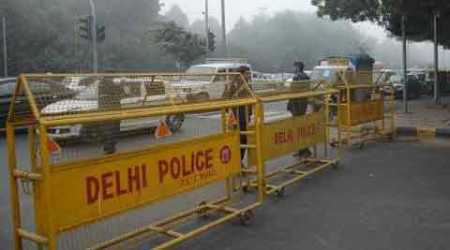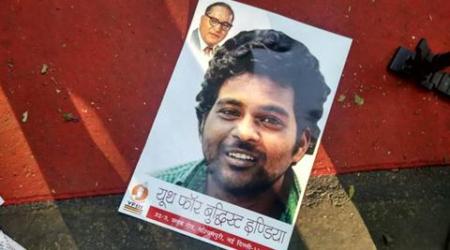‘Modi’ squatted next to a hand pump close to Gurdwara Bangla Sahib on Wednesday to clean a 15-kg tin can that once held desi ghee. He rinsed out the previous night’s dal and scooped a fist full of wet mud to use as detergent: to scrape off any stubborn remains. Minutes later, he arrived at the langar to pick up lunch for the Tamil farmers, who have been camping at Jantar Mantar for the past 10 days.
‘Modi’ is just one of several names that 28-year-old Prakash Chidambaram goes by. His Facebook name, for instance, is Aksharp — inspired by the jumbled letter game in an English newspaper from the South.
He was named after India’s Prime Minister after the first day of protests by Tamil farmers at Jantar Mantar. “I wore a Modi mask when we were protesting and the name stuck.”
Fifteen minutes earlier, Prakash and Ramalingam had collected the two tins — vessels given to them by volunteers who dish out the langar at the gurdwara. After collecting the vessels, they began the one-kilometre walk from Jantar Mantar.
“This is how they recognise us when we go back each day,” the men told The Indian Express, while pointing at the vessels. They said they will take an auto-rickshaw back — the contents of the tin too hot to balance on their heads even for a short walk.
At the hand pump, where the men stop every day to rinse out the tins, Ramalingam cut his finger due to the sharp edges of the tin can. This would become the topic of conversation later between the Hindi-speaking volunteers and the Tamil-speaking farmers inside the gurdwara — past the ration storeroom stacked high with grains.
“Be careful of the edges, hold the tin from the top,” advises 61-year-old Amarjeet Singh Taneja. The Tamil men nodded, unable to comprehend a word.
The menu on Wednesday is mixed dal, aloo soya bean sabzi, rice and chapati — the wheat flat bread that Tamil stomachs find unfamiliar and hard to digest. The oil, which is different from the one they use back home, doesn’t suit their palate either, they said.
Prakash is invited to have a closer look at the choice. He picks the aloo soya bean sabzi over the dal and rice over the chapati.
“This won’t be enough,” scolds the older Ramaligam. “How will this be enough for all of us? Go, ask for more…” Prakash does, and also picks up a small stack of chapatis on his way out. Some of his colleagues have acquired a taste, he admitted.
During the walk, Prakash reminisced about home — how his younger brother would steal the TV remote and how his mother would cook food.
“The problem here (in Delhi) is the ‘side-dish’,” he said, adding, “It’s not spicy enough. I miss my mother’s cooking. I have never eaten out back home in Tiruchi.”
P Krishnan, 65, agreed. He was lying on his side on a plastic sheet at Jantar Mantar thinking about idlis. “It’s chapati for breakfast, chapati for lunch, and chapati for dinner,” he laughed. “I went to the Kerala House mess nearby and paid money and ate a plate of idlis.”

